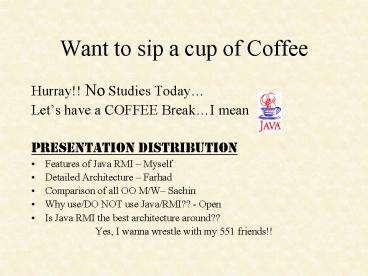Want to sip a cup of Coffee - PowerPoint PPT Presentation
1 / 15
Title:
Want to sip a cup of Coffee
Description:
Features of Java RMI Myself. Detailed Architecture Farhad. Comparison of all OO ... Yes, I wanna wrestle with my 551 friends!! The cup is taken for Granted ... – PowerPoint PPT presentation
Number of Views:35
Avg rating:3.0/5.0
Title: Want to sip a cup of Coffee
1
Want to sip a cup of Coffee
- Hurray!! No Studies Today
- Lets have a COFFEE BreakI mean
- Presentation Distribution
- Features of Java RMI Myself
- Detailed Architecture Farhad
- Comparison of all OO M/W Sachin
- Why use/DO NOT use Java/RMI?? - Open
- Is Java RMI the best architecture around??
- Yes, I wanna wrestle with my 551 friends!!
2
The cup is taken for Granted
- RMI has all the features Java possesses viz.
portability, hybrid language, blahblah..blah - Both client/server is written in Java the
execution is in a java VM. - Distinction between interfaces and classes
3
Specification
- OO Language-Sun MicroSystem-Creates a
bytestream-interpreted by VM JDK 1.1 - Java uses API called RMI. I am born here.
- Design-Object communication, integration with
java object model and resolution of
heterogeneity. - Abstraction of UDP datagrams and TCP streams.
- High level servicesJINI, EJB sits on top of me.
4
Meta-Object Model
- I dont need stupid IDL
- Restriction of the visibility of declarations-
scooping mechanism (packages). (Similar to
CORBA). There is need to identify the packages
file to which the declarations exists.
5
Objects
- Both C/S objects in java-invoke each other.
- LPC-governed by class definition, RMI by
Interfaces. - Sorry NO location transparency Please!!
- I know U from my Servers RMI registry
6
Types
- Strongly typed language
- It has a static type system
- It supports atomic types(int,float,double char)
- Java object types includes both classes and
interfaces. - Server objects that wants to be accessible
remotely needs to implement at least one
interface.
7
Attributes
- I/F cannot define attributes.This is similar to
COM.In CORBA, they support as attributes are
treated as operations.Thus, the designers of
remote objects have to write access operations.
8
Operations
- Operations in java are called methods. A client
object can request execution of all those methods
that are declared in all remote interfaces of
server objects. - Operations should only have atomic non-remote
object types and remote interfaces. - The mechanism for passing objects to a remote
object is different from local procedure call.
9
Operations (Contd..)
- No location transparency unlike in CORBA.
- 1.Parameter passing of atomic type CBV(L/R
calls) - 2.Object passing CBR(For local calls)
- 3.Object passingSerializable (Passed BV)(L-R
calls) - Client copies the object before passing
- 4.Object passing CBR
- (For remote objects to remote method.) Object
is copied but should be kept on the same host.
10
Application Designers Beware
- 3 scenarios
- For NR objects to pass to R object-use serialize
I/F. We have to know that object has to be passed
to the R method. - When passing NR object to R method, any changes
made at remote method to the object will not
reflect at the local end. - When passing R object to R method, any changes
made at R object will be seen at the L end.
11
Requests
- Objects requests in java are RMI.
- Supports at-most-once semantics requests
- Java only supports static RMI (i.e. Java RMI can
only be defined at the time when client object is
compiled). It does not support dynamic RMI as it
does have reflection API.
12
Failure Handling
- If failure occurs, java throws exception.
- Any interface that extends remote has to declare,
to throw RemoteException. - Remote methods may throw additional exceptions,
which may be very useful to developers.
13
Multiple Inheritance
- My friend, Java supports inheritance so do I.
- I dont like MI for classes but I support MI for
I/Fs. - Remote inheritance can inherited from remote and
non-remote interfaces at the same time as long as
remote interfaces are allowed to throw
RemoteException error.
14
Polymorphism
- Java supports polymorphism that is statically
restricted by inheritance, so do I. - Ensures type-safety (only possible if static type
is a SuperType of static type to be assigned). - With multiple interface inheritance, it became
possible to have polymorphism between remote and
non-remote objects.
15
So how does my tastes??

